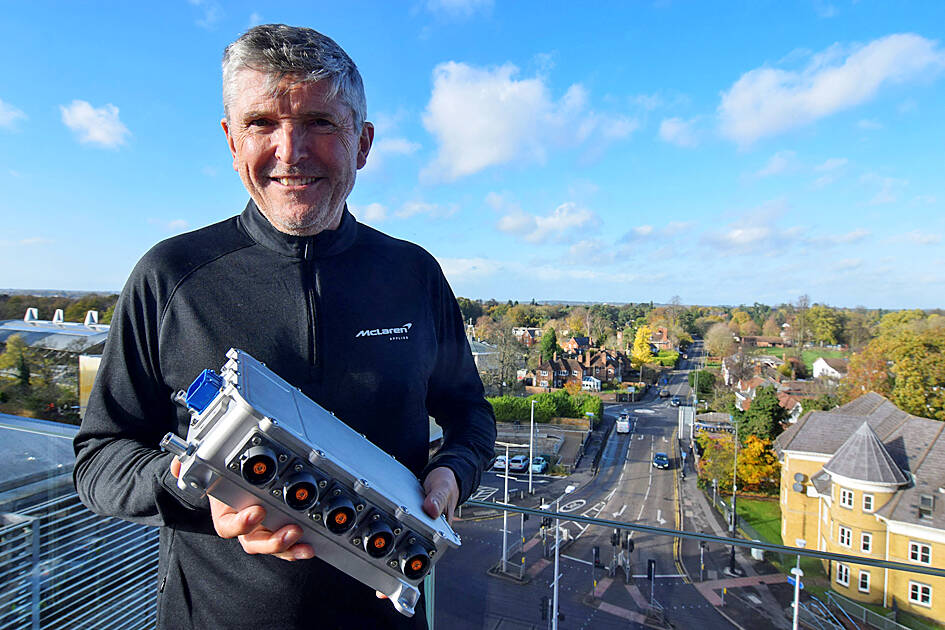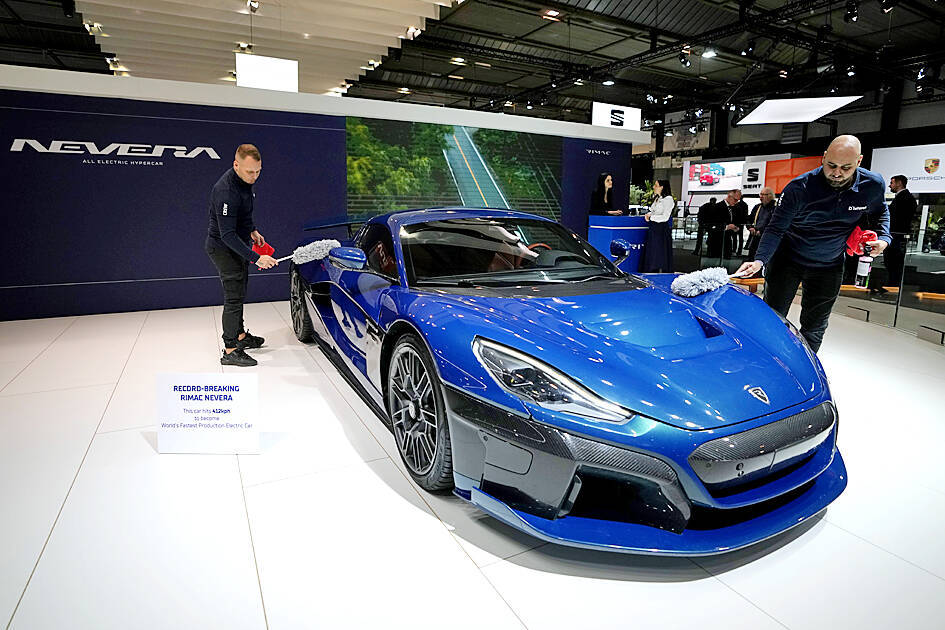The global auto industry has committed US$1.2 trillion to developing electric vehicles (EVs), providing a golden opportunity for new suppliers to grab contracts providing everything from battery packs to motors and inverters.
Start-ups specializing in batteries and coatings to protect EV parts, and suppliers traditionally focused on niche motorsports or Formula One (F1) racing, have been chasing EV contracts. As the next generation of EVs is due to hit around 2025, many carmakers have sought help plugging gaps in their expertise, providing a window of opportunity for new suppliers.
“We’ve gone back to the days of Henry Ford where everyone is asking ‘how do you make these things work properly?’” said Nick Fry, CEO of F1 engineering and technology firm McLaren Applied Ltd. “That’s a huge opportunity for companies like us.”

Photo: Reuters
McLaren Applied has adapted an efficient inverter developed for F1 racing for EVs. An inverter helps control the flow of electricity to and from the battery pack.
The silicon carbide IPG5 inverter weighs just 5.5kg and can extend an EV’s range by over 7 percent.
Fry says McLaren Applied is working with around 20 carmakers and suppliers, and the inverter will appear in high-volume luxury EV models starting in January 2025.

Photo: AP
Mass-market carmakers often prefer to develop EV components in-house and own the technology themselves. After years of pandemic-related parts shortages, they are wary of over-reliance on suppliers.
“We just can’t afford to be reliant on third parties making those investments for us,” said Tim Slatter, head of Ford Motor Co in Britain.
Traditional suppliers, such as German heavyweights Robert Bosch GmbH and Continental AG, are also investing heavily in EVs and other technologies to stay ahead in a fast-changing industry.
However, smaller companies say there are still opportunities, particularly with low-volume manufacturers that cannot afford huge EV investments, or luxury and high-performance carmakers seeking an edge.
Croatia’s Rimac Automobili, an electric hypercar maker part-owned by Germany’s Porsche AG that also supplies battery systems and powertrain components to other automakers, says an undisclosed German carmaker will use a Rimac battery system in a high-performance model — with annual production of around 40,000 units — starting this year, with more signed up.
“We need to be 20 percent, 30 percent better than what they can do and then they work with us,” CEO Mate Rimac said. “If they can make a 100 kilowatt-hour battery pack, we must make a 130 kilowatt pack in the same dimensions for the same cost.”
Some suppliers like Cambridge, Massachusetts-based Actnano Inc have had long relationships with EV pioneer Tesla Inc. Actnano has developed a coating that protects EV parts from condensation and its business has spread to advanced driver-assistance systems (ADAS), as well as other carmakers including Volvo Cars Group AB, Ford, BMW AG and Porsche.
California-based start-up CelLink Corp has developed an entirely automated, flat and easy-to-install “flex harness,” instead of a wire harness to group and guide cables in a vehicle.
CelLink CEO Kevin Coakley would not identify customers, but said CelLink’s harnesses had been installed in around 1 million EVs. Only Tesla has that scale.
Coakley said CelLink was working with US and European carmakers, and with a European battery maker on battery wiring.
Others are focused on low-volume manufacturers, like UK start-up Ionetic, which develops battery packs that would be too expensive for smaller companies to make themselves.
“Currently it costs just too much to electrify, which is why you see some manufacturers delaying their electrification launch,” Ionetic CEO James Eaton said.
Since 1971, Swindon Powertrain Ltd has developed powerful motorsports engines, but it has now also developed battery packs, electric powertrains and e-axles, and is working with around 20 customers, including carmakers and an electric vertical take-off and landing aircraft maker.
“I realized if we don’t embrace this, we’re going to end up working for museums,” Swindon Powertrain managing director Raphael Caille said.

Among the rows of vibrators, rubber torsos and leather harnesses at a Chinese sex toys exhibition in Shanghai this weekend, the beginnings of an artificial intelligence (AI)-driven shift in the industry quietly pulsed. China manufactures about 70 percent of the world’s sex toys, most of it the “hardware” on display at the fair — whether that be technicolor tentacled dildos or hyper-realistic personalized silicone dolls. Yet smart toys have been rising in popularity for some time. Many major European and US brands already offer tech-enhanced products that can enable long-distance love, monitor well-being and even bring people one step closer to

Malaysia’s leader yesterday announced plans to build a massive semiconductor design park, aiming to boost the Southeast Asian nation’s role in the global chip industry. A prominent player in the semiconductor industry for decades, Malaysia accounts for an estimated 13 percent of global back-end manufacturing, according to German tech giant Bosch. Now it wants to go beyond production and emerge as a chip design powerhouse too, Malaysian Prime Minister Anwar Ibrahim said. “I am pleased to announce the largest IC (integrated circuit) Design Park in Southeast Asia, that will house world-class anchor tenants and collaborate with global companies such as Arm [Holdings PLC],”

TRANSFORMATION: Taiwan is now home to the largest Google hardware research and development center outside of the US, thanks to the nation’s economic policies President Tsai Ing-wen (蔡英文) yesterday attended an event marking the opening of Google’s second hardware research and development (R&D) office in Taiwan, which was held at New Taipei City’s Banciao District (板橋). This signals Taiwan’s transformation into the world’s largest Google hardware research and development center outside of the US, validating the nation’s economic policy in the past eight years, she said. The “five plus two” innovative industries policy, “six core strategic industries” initiative and infrastructure projects have grown the national industry and established resilient supply chains that withstood the COVID-19 pandemic, Tsai said. Taiwan has improved investment conditions of the domestic economy

Sales in the retail, and food and beverage sectors last month continued to rise, increasing 0.7 percent and 13.6 percent respectively from a year earlier, setting record highs for the month of March, the Ministry of Economic Affairs said yesterday. Sales in the wholesale sector also grew last month by 4.6 annually, mainly due to the business opportunities for emerging applications related to artificial intelligence (AI) and high-performance computing technologies, the ministry said in a report. The ministry forecast that retail, and food and beverage sales this month would retain their growth momentum as the former would benefit from Tomb Sweeping Day